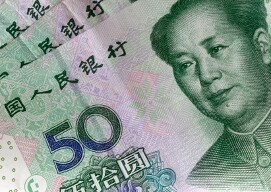
The Chinese yuan fell to its lowest level since June 2017 after the federal government vowed to adopt a more proactive fiscal initiative, reversing a previous policy of winding down stimulus efforts and unloading debt. This comes as the US government promised it would keep a close eye on potential currency manipulation by the world’s second-largest economy.
Earlier this week, Chinaâs cabinet, the State Council, indicated that it will introduce a series of economic policies to boost domestic growth amid trade tensions with the US. Some of the policy measures will consist of issuing $207 billion in special bonds by local governments, lending $103 billion to financial institutions, and boosting infrastructure spending.
Local analysts believe that this could prompt Beijing to roll out even more stimulus efforts and slash reserve requirement ratios. This is a complete reversal of last yearâs plan to decrease risky lending, reduce debt burdens, and employ more pro-market measures.
Speaking in Sao Paulo, Brazil over the weekend, Treasury Secretary Steven Mnuchin noted that the US government will be monitoring the yuanâs recent weakness and determine if it is currency manipulation. He added that the US will be speaking with Canada, Japan, and European allies about Beijingâs non-market economic policies.
Mnuchin told Reuters:
I’m not saying whether it’s a weapon or not a weapon. There’s no question that the weakening of the currency creates an unfair advantage for them.
We’re going to very carefully review whether they have manipulated the currency.
We want them to play by the rules. And that means no forced technology transfer, no forced joint ventures and giving our companies the opportunity to compete fairly. These are issues that are completely consistent across the G7. These issues are shared jointly.
But the International Monetary Fund (IMF) wrote in its annual External Sector Report on Tuesday that Chinaâs yuan is in line with fundamentals, confirming that the Peopleâs Bank of China (PBOC) is not purposely debasing the currency. The IMF added that Chinaâs current account surplus rose last year to 1.7% of gross domestic product (GDP), adding China to its list of countries with excessive balances.
The yuan has significantly tumbled in recent weeks as economic growth stalls and trade spates with the worldâs largest economy intensify.
The USD/CNY currency pair slumped 0.32% to 6.7697, from an opening of 6.7915, at 16:29 GMT on Wednesday. The EUR/CNY also fell 0.45% to 7.9067 from an opening of 7.9423.
If you have any questions, comments or opinions regarding the Chinese Yuan,
feel free to post them using the commentary form below.